Business Law and Ethics Report: Analyzing the Bhopal Gas Tragedy
VerifiedAdded on 2023/01/04
|8
|1824
|48
Report
AI Summary
This report provides a comprehensive analysis of the Bhopal gas tragedy, examining the event from a business law and ethics perspective. It begins with an introduction to commercial law and ethics, emphasizing the importance of compliance. The report then details the Bhopal disaster, describing the leak of methyl isocyanate (MIC) from the Union Carbide India Limited (UCIL) pesticide plant. It outlines the warning signs before the disaster, including complaints about pollution and earlier gas leaks. The report explores the consequences of the disaster, including the immediate and long-term health effects on the population, the environmental damage, and the legal aftermath. It discusses the ethical negligence of UCIL, highlighting issues such as underinvestment in safety, lack of training, and failure to take responsibility. The report concludes by emphasizing the role of business law and ethics in guiding business operations and the lessons learned from the Bhopal tragedy, including the development of absolute liability principles and environmental protection laws. References to relevant books and journals are included.
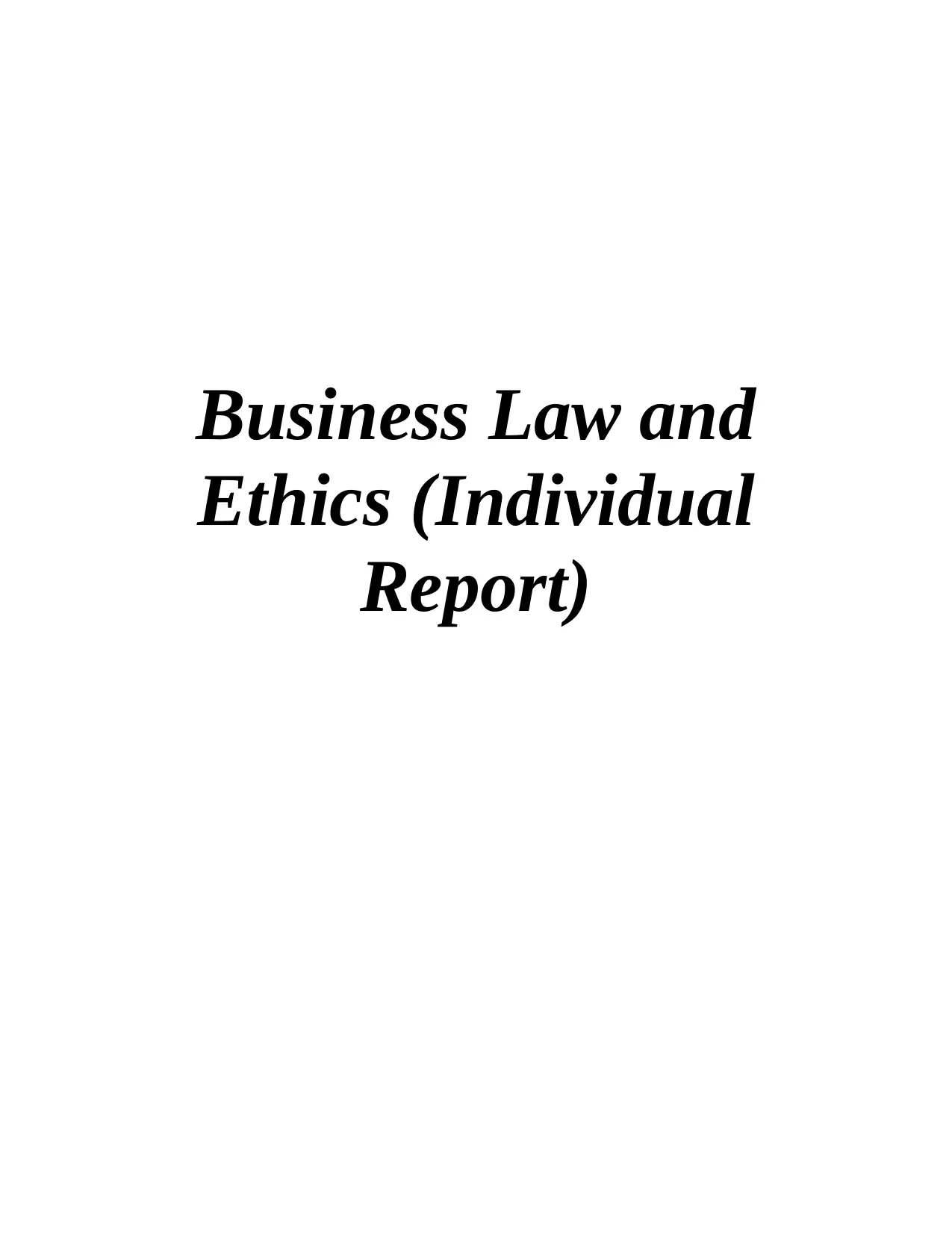
Business Law and
Ethics (Individual
Report)
Ethics (Individual
Report)
Paraphrase This Document
Need a fresh take? Get an instant paraphrase of this document with our AI Paraphraser
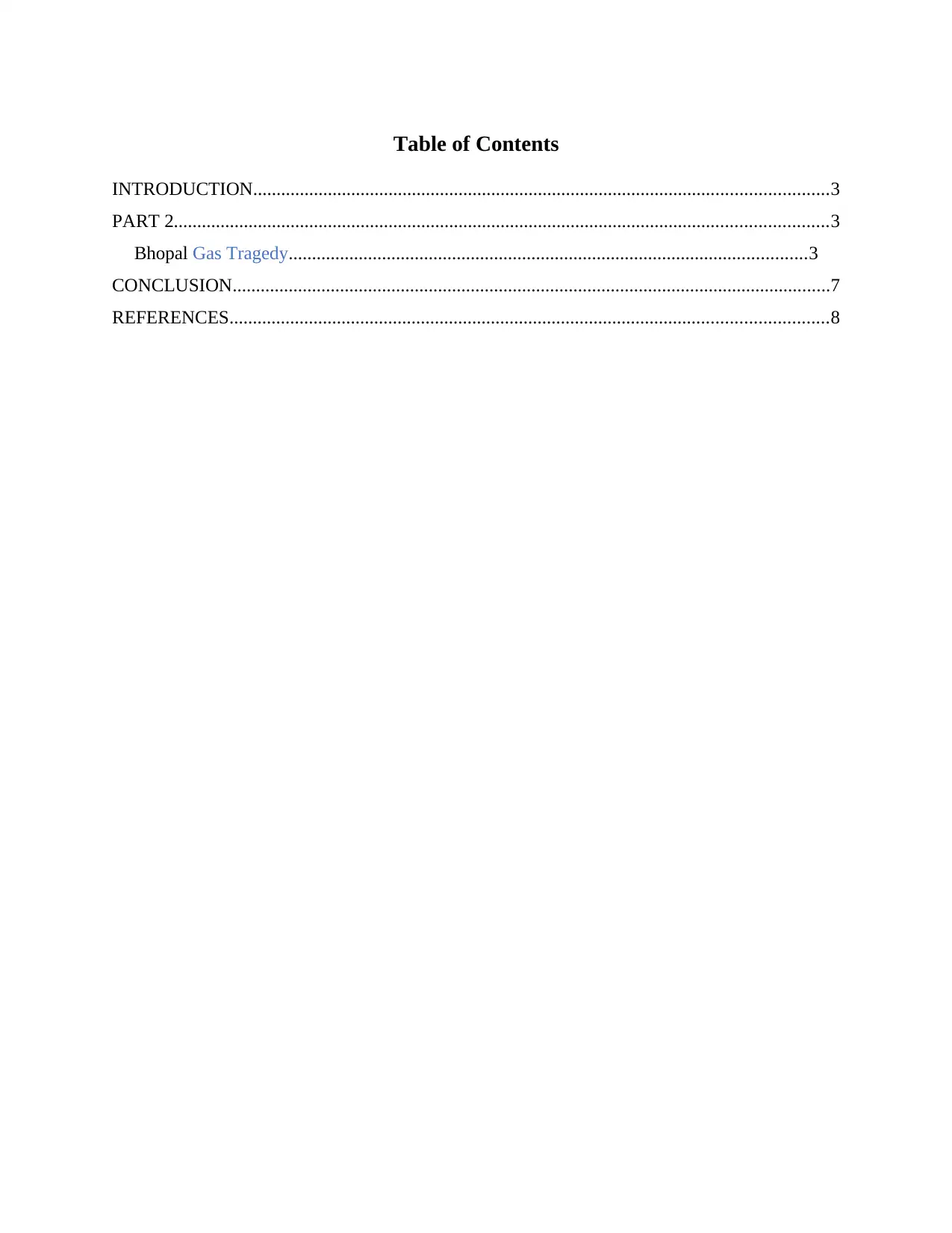
Table of Contents
INTRODUCTION...........................................................................................................................3
PART 2............................................................................................................................................3
Bhopal Gas Tragedy...............................................................................................................3
CONCLUSION................................................................................................................................7
REFERENCES................................................................................................................................8
INTRODUCTION...........................................................................................................................3
PART 2............................................................................................................................................3
Bhopal Gas Tragedy...............................................................................................................3
CONCLUSION................................................................................................................................7
REFERENCES................................................................................................................................8
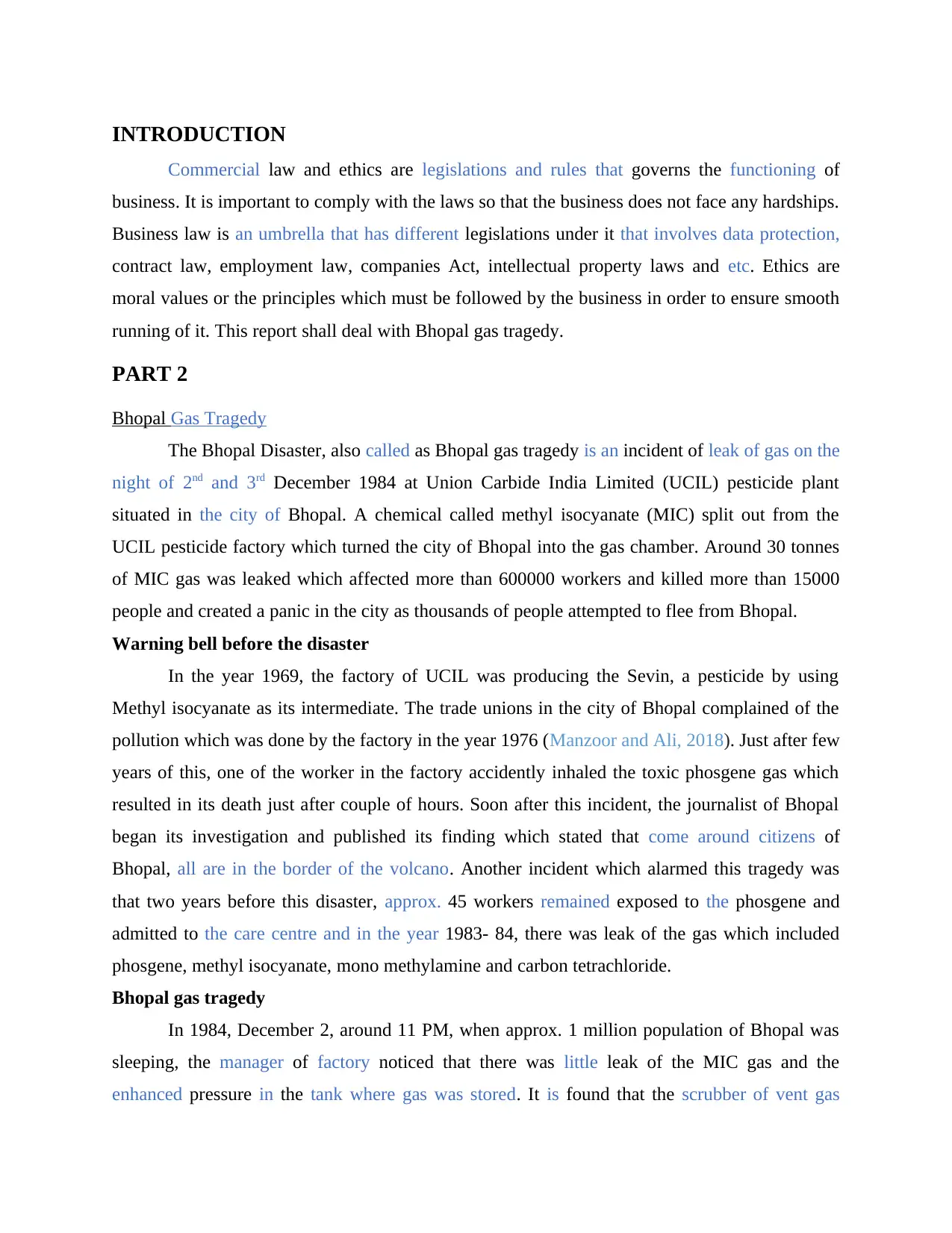
INTRODUCTION
Commercial law and ethics are legislations and rules that governs the functioning of
business. It is important to comply with the laws so that the business does not face any hardships.
Business law is an umbrella that has different legislations under it that involves data protection,
contract law, employment law, companies Act, intellectual property laws and etc. Ethics are
moral values or the principles which must be followed by the business in order to ensure smooth
running of it. This report shall deal with Bhopal gas tragedy.
PART 2
Bhopal Gas Tragedy
The Bhopal Disaster, also called as Bhopal gas tragedy is an incident of leak of gas on the
night of 2nd and 3rd December 1984 at Union Carbide India Limited (UCIL) pesticide plant
situated in the city of Bhopal. A chemical called methyl isocyanate (MIC) split out from the
UCIL pesticide factory which turned the city of Bhopal into the gas chamber. Around 30 tonnes
of MIC gas was leaked which affected more than 600000 workers and killed more than 15000
people and created a panic in the city as thousands of people attempted to flee from Bhopal.
Warning bell before the disaster
In the year 1969, the factory of UCIL was producing the Sevin, a pesticide by using
Methyl isocyanate as its intermediate. The trade unions in the city of Bhopal complained of the
pollution which was done by the factory in the year 1976 (Manzoor and Ali, 2018). Just after few
years of this, one of the worker in the factory accidently inhaled the toxic phosgene gas which
resulted in its death just after couple of hours. Soon after this incident, the journalist of Bhopal
began its investigation and published its finding which stated that come around citizens of
Bhopal, all are in the border of the volcano. Another incident which alarmed this tragedy was
that two years before this disaster, approx. 45 workers remained exposed to the phosgene and
admitted to the care centre and in the year 1983- 84, there was leak of the gas which included
phosgene, methyl isocyanate, mono methylamine and carbon tetrachloride.
Bhopal gas tragedy
In 1984, December 2, around 11 PM, when approx. 1 million population of Bhopal was
sleeping, the manager of factory noticed that there was little leak of the MIC gas and the
enhanced pressure in the tank where gas was stored. It is found that the scrubber of vent gas
Commercial law and ethics are legislations and rules that governs the functioning of
business. It is important to comply with the laws so that the business does not face any hardships.
Business law is an umbrella that has different legislations under it that involves data protection,
contract law, employment law, companies Act, intellectual property laws and etc. Ethics are
moral values or the principles which must be followed by the business in order to ensure smooth
running of it. This report shall deal with Bhopal gas tragedy.
PART 2
Bhopal Gas Tragedy
The Bhopal Disaster, also called as Bhopal gas tragedy is an incident of leak of gas on the
night of 2nd and 3rd December 1984 at Union Carbide India Limited (UCIL) pesticide plant
situated in the city of Bhopal. A chemical called methyl isocyanate (MIC) split out from the
UCIL pesticide factory which turned the city of Bhopal into the gas chamber. Around 30 tonnes
of MIC gas was leaked which affected more than 600000 workers and killed more than 15000
people and created a panic in the city as thousands of people attempted to flee from Bhopal.
Warning bell before the disaster
In the year 1969, the factory of UCIL was producing the Sevin, a pesticide by using
Methyl isocyanate as its intermediate. The trade unions in the city of Bhopal complained of the
pollution which was done by the factory in the year 1976 (Manzoor and Ali, 2018). Just after few
years of this, one of the worker in the factory accidently inhaled the toxic phosgene gas which
resulted in its death just after couple of hours. Soon after this incident, the journalist of Bhopal
began its investigation and published its finding which stated that come around citizens of
Bhopal, all are in the border of the volcano. Another incident which alarmed this tragedy was
that two years before this disaster, approx. 45 workers remained exposed to the phosgene and
admitted to the care centre and in the year 1983- 84, there was leak of the gas which included
phosgene, methyl isocyanate, mono methylamine and carbon tetrachloride.
Bhopal gas tragedy
In 1984, December 2, around 11 PM, when approx. 1 million population of Bhopal was
sleeping, the manager of factory noticed that there was little leak of the MIC gas and the
enhanced pressure in the tank where gas was stored. It is found that the scrubber of vent gas
⊘ This is a preview!⊘
Do you want full access?
Subscribe today to unlock all pages.

Trusted by 1+ million students worldwide
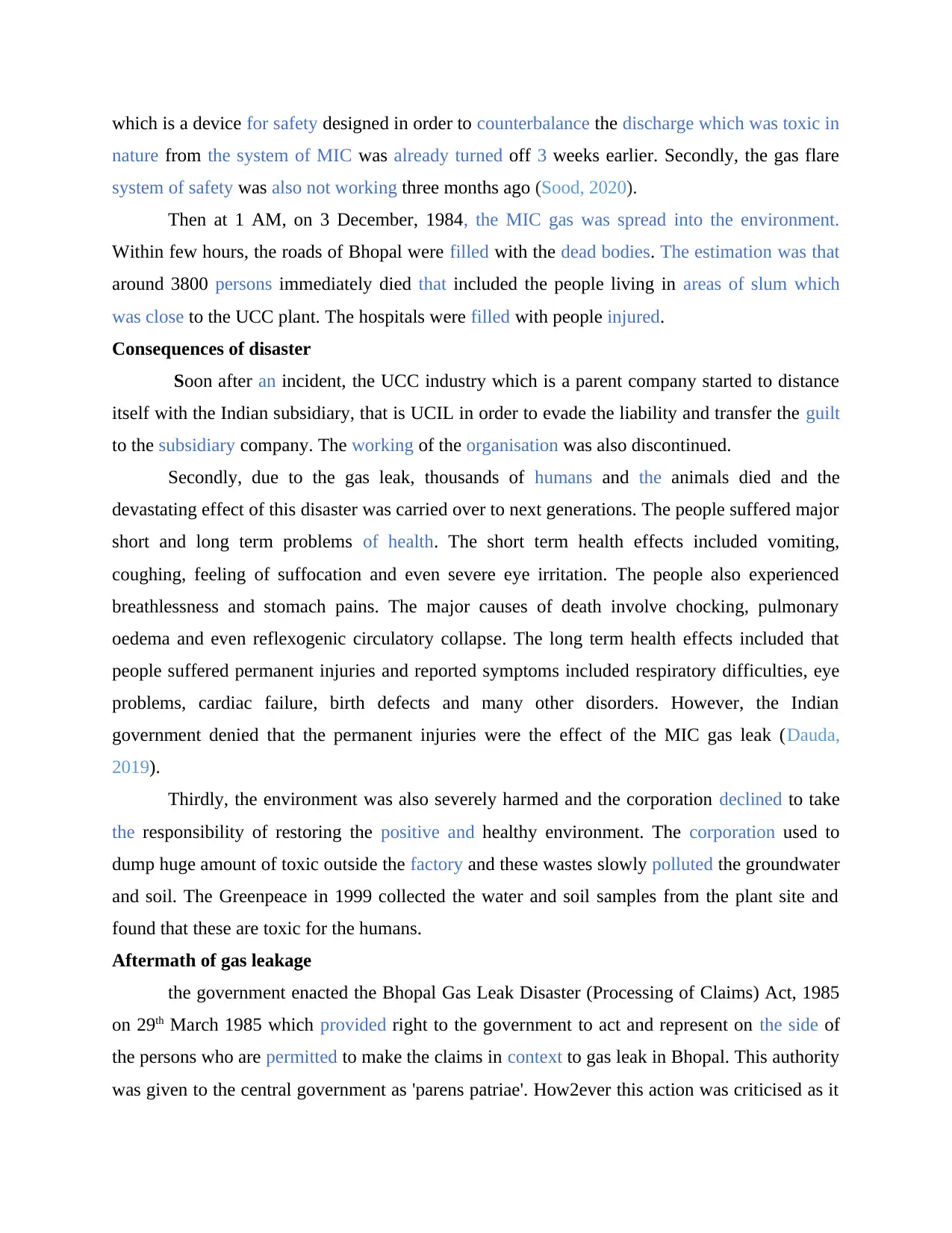
which is a device for safety designed in order to counterbalance the discharge which was toxic in
nature from the system of MIC was already turned off 3 weeks earlier. Secondly, the gas flare
system of safety was also not working three months ago (Sood, 2020).
Then at 1 AM, on 3 December, 1984, the MIC gas was spread into the environment.
Within few hours, the roads of Bhopal were filled with the dead bodies. The estimation was that
around 3800 persons immediately died that included the people living in areas of slum which
was close to the UCC plant. The hospitals were filled with people injured.
Consequences of disaster
Soon after an incident, the UCC industry which is a parent company started to distance
itself with the Indian subsidiary, that is UCIL in order to evade the liability and transfer the guilt
to the subsidiary company. The working of the organisation was also discontinued.
Secondly, due to the gas leak, thousands of humans and the animals died and the
devastating effect of this disaster was carried over to next generations. The people suffered major
short and long term problems of health. The short term health effects included vomiting,
coughing, feeling of suffocation and even severe eye irritation. The people also experienced
breathlessness and stomach pains. The major causes of death involve chocking, pulmonary
oedema and even reflexogenic circulatory collapse. The long term health effects included that
people suffered permanent injuries and reported symptoms included respiratory difficulties, eye
problems, cardiac failure, birth defects and many other disorders. However, the Indian
government denied that the permanent injuries were the effect of the MIC gas leak (Dauda,
2019).
Thirdly, the environment was also severely harmed and the corporation declined to take
the responsibility of restoring the positive and healthy environment. The corporation used to
dump huge amount of toxic outside the factory and these wastes slowly polluted the groundwater
and soil. The Greenpeace in 1999 collected the water and soil samples from the plant site and
found that these are toxic for the humans.
Aftermath of gas leakage
the government enacted the Bhopal Gas Leak Disaster (Processing of Claims) Act, 1985
on 29th March 1985 which provided right to the government to act and represent on the side of
the persons who are permitted to make the claims in context to gas leak in Bhopal. This authority
was given to the central government as 'parens patriae'. How2ever this action was criticised as it
nature from the system of MIC was already turned off 3 weeks earlier. Secondly, the gas flare
system of safety was also not working three months ago (Sood, 2020).
Then at 1 AM, on 3 December, 1984, the MIC gas was spread into the environment.
Within few hours, the roads of Bhopal were filled with the dead bodies. The estimation was that
around 3800 persons immediately died that included the people living in areas of slum which
was close to the UCC plant. The hospitals were filled with people injured.
Consequences of disaster
Soon after an incident, the UCC industry which is a parent company started to distance
itself with the Indian subsidiary, that is UCIL in order to evade the liability and transfer the guilt
to the subsidiary company. The working of the organisation was also discontinued.
Secondly, due to the gas leak, thousands of humans and the animals died and the
devastating effect of this disaster was carried over to next generations. The people suffered major
short and long term problems of health. The short term health effects included vomiting,
coughing, feeling of suffocation and even severe eye irritation. The people also experienced
breathlessness and stomach pains. The major causes of death involve chocking, pulmonary
oedema and even reflexogenic circulatory collapse. The long term health effects included that
people suffered permanent injuries and reported symptoms included respiratory difficulties, eye
problems, cardiac failure, birth defects and many other disorders. However, the Indian
government denied that the permanent injuries were the effect of the MIC gas leak (Dauda,
2019).
Thirdly, the environment was also severely harmed and the corporation declined to take
the responsibility of restoring the positive and healthy environment. The corporation used to
dump huge amount of toxic outside the factory and these wastes slowly polluted the groundwater
and soil. The Greenpeace in 1999 collected the water and soil samples from the plant site and
found that these are toxic for the humans.
Aftermath of gas leakage
the government enacted the Bhopal Gas Leak Disaster (Processing of Claims) Act, 1985
on 29th March 1985 which provided right to the government to act and represent on the side of
the persons who are permitted to make the claims in context to gas leak in Bhopal. This authority
was given to the central government as 'parens patriae'. How2ever this action was criticised as it
Paraphrase This Document
Need a fresh take? Get an instant paraphrase of this document with our AI Paraphraser
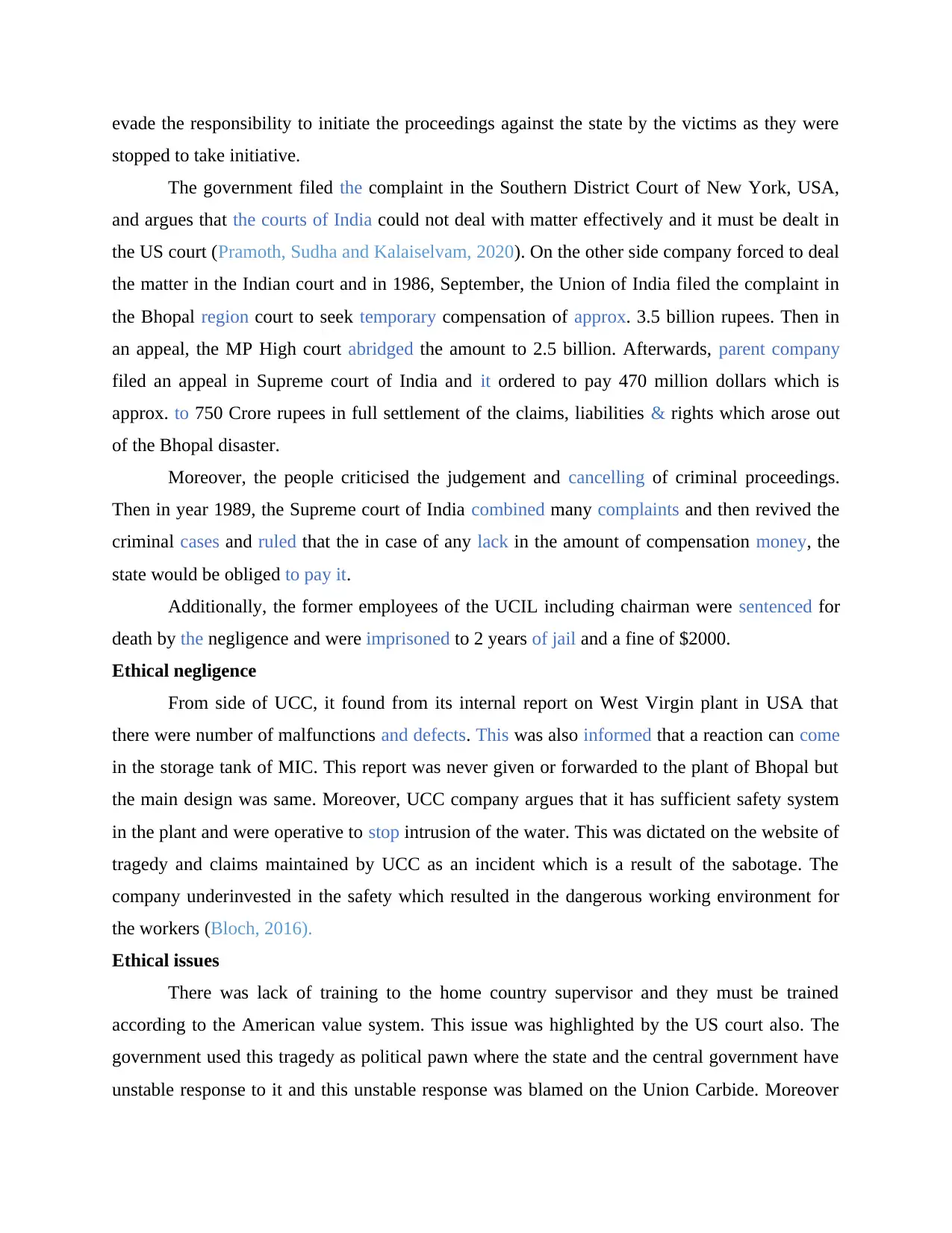
evade the responsibility to initiate the proceedings against the state by the victims as they were
stopped to take initiative.
The government filed the complaint in the Southern District Court of New York, USA,
and argues that the courts of India could not deal with matter effectively and it must be dealt in
the US court (Pramoth, Sudha and Kalaiselvam, 2020). On the other side company forced to deal
the matter in the Indian court and in 1986, September, the Union of India filed the complaint in
the Bhopal region court to seek temporary compensation of approx. 3.5 billion rupees. Then in
an appeal, the MP High court abridged the amount to 2.5 billion. Afterwards, parent company
filed an appeal in Supreme court of India and it ordered to pay 470 million dollars which is
approx. to 750 Crore rupees in full settlement of the claims, liabilities & rights which arose out
of the Bhopal disaster.
Moreover, the people criticised the judgement and cancelling of criminal proceedings.
Then in year 1989, the Supreme court of India combined many complaints and then revived the
criminal cases and ruled that the in case of any lack in the amount of compensation money, the
state would be obliged to pay it.
Additionally, the former employees of the UCIL including chairman were sentenced for
death by the negligence and were imprisoned to 2 years of jail and a fine of $2000.
Ethical negligence
From side of UCC, it found from its internal report on West Virgin plant in USA that
there were number of malfunctions and defects. This was also informed that a reaction can come
in the storage tank of MIC. This report was never given or forwarded to the plant of Bhopal but
the main design was same. Moreover, UCC company argues that it has sufficient safety system
in the plant and were operative to stop intrusion of the water. This was dictated on the website of
tragedy and claims maintained by UCC as an incident which is a result of the sabotage. The
company underinvested in the safety which resulted in the dangerous working environment for
the workers (Bloch, 2016).
Ethical issues
There was lack of training to the home country supervisor and they must be trained
according to the American value system. This issue was highlighted by the US court also. The
government used this tragedy as political pawn where the state and the central government have
unstable response to it and this unstable response was blamed on the Union Carbide. Moreover
stopped to take initiative.
The government filed the complaint in the Southern District Court of New York, USA,
and argues that the courts of India could not deal with matter effectively and it must be dealt in
the US court (Pramoth, Sudha and Kalaiselvam, 2020). On the other side company forced to deal
the matter in the Indian court and in 1986, September, the Union of India filed the complaint in
the Bhopal region court to seek temporary compensation of approx. 3.5 billion rupees. Then in
an appeal, the MP High court abridged the amount to 2.5 billion. Afterwards, parent company
filed an appeal in Supreme court of India and it ordered to pay 470 million dollars which is
approx. to 750 Crore rupees in full settlement of the claims, liabilities & rights which arose out
of the Bhopal disaster.
Moreover, the people criticised the judgement and cancelling of criminal proceedings.
Then in year 1989, the Supreme court of India combined many complaints and then revived the
criminal cases and ruled that the in case of any lack in the amount of compensation money, the
state would be obliged to pay it.
Additionally, the former employees of the UCIL including chairman were sentenced for
death by the negligence and were imprisoned to 2 years of jail and a fine of $2000.
Ethical negligence
From side of UCC, it found from its internal report on West Virgin plant in USA that
there were number of malfunctions and defects. This was also informed that a reaction can come
in the storage tank of MIC. This report was never given or forwarded to the plant of Bhopal but
the main design was same. Moreover, UCC company argues that it has sufficient safety system
in the plant and were operative to stop intrusion of the water. This was dictated on the website of
tragedy and claims maintained by UCC as an incident which is a result of the sabotage. The
company underinvested in the safety which resulted in the dangerous working environment for
the workers (Bloch, 2016).
Ethical issues
There was lack of training to the home country supervisor and they must be trained
according to the American value system. This issue was highlighted by the US court also. The
government used this tragedy as political pawn where the state and the central government have
unstable response to it and this unstable response was blamed on the Union Carbide. Moreover
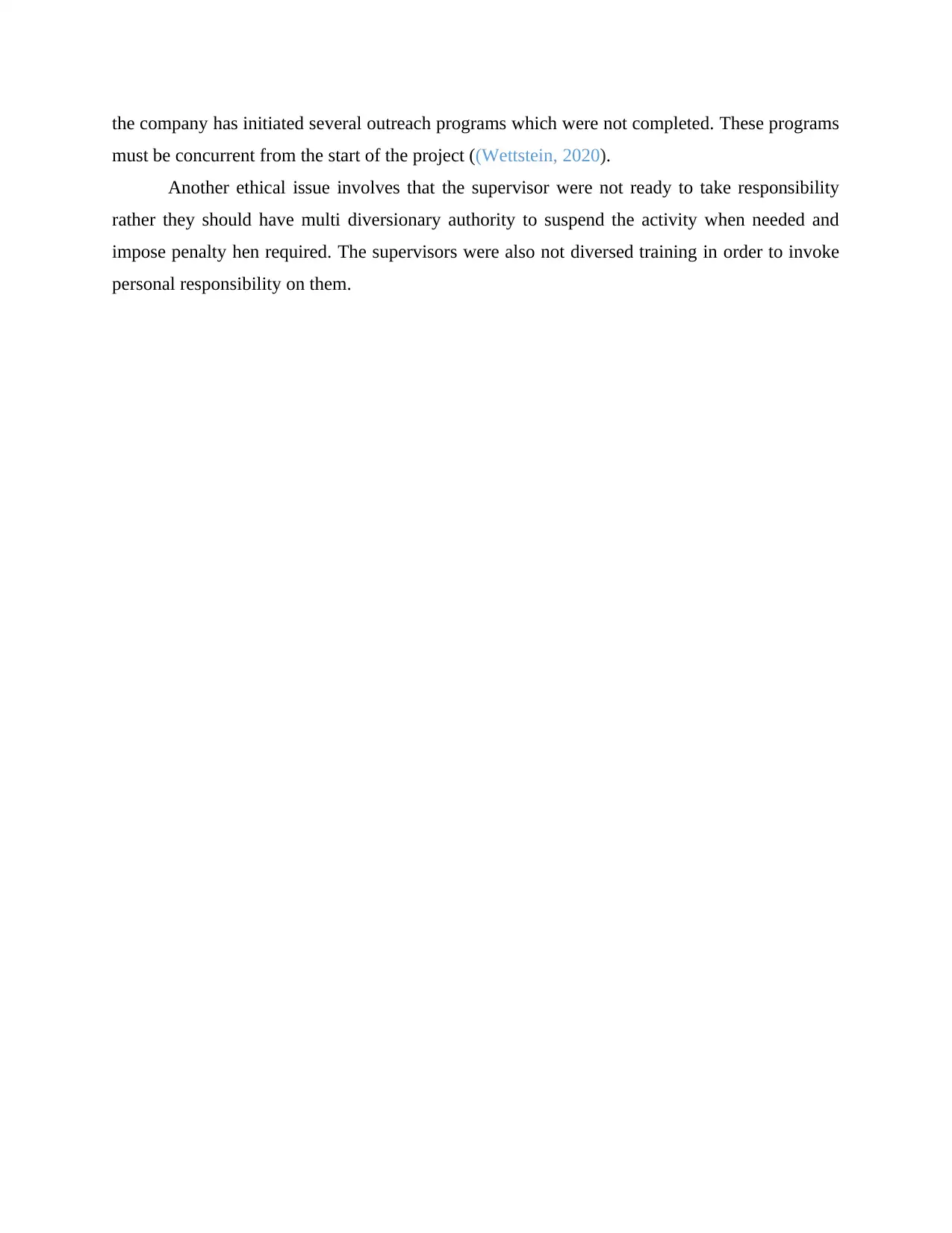
the company has initiated several outreach programs which were not completed. These programs
must be concurrent from the start of the project ((Wettstein, 2020).
Another ethical issue involves that the supervisor were not ready to take responsibility
rather they should have multi diversionary authority to suspend the activity when needed and
impose penalty hen required. The supervisors were also not diversed training in order to invoke
personal responsibility on them.
must be concurrent from the start of the project ((Wettstein, 2020).
Another ethical issue involves that the supervisor were not ready to take responsibility
rather they should have multi diversionary authority to suspend the activity when needed and
impose penalty hen required. The supervisors were also not diversed training in order to invoke
personal responsibility on them.
⊘ This is a preview!⊘
Do you want full access?
Subscribe today to unlock all pages.

Trusted by 1+ million students worldwide
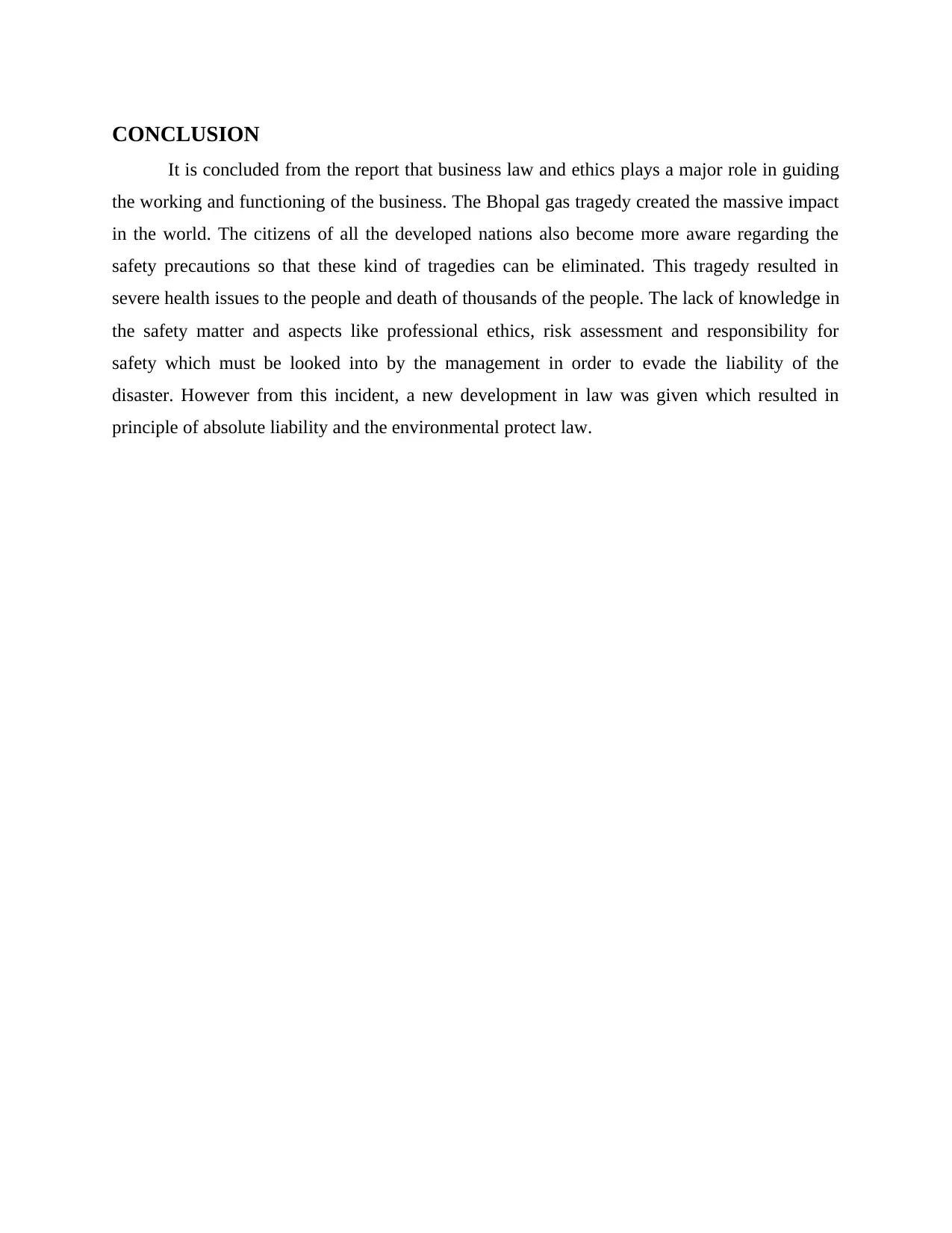
CONCLUSION
It is concluded from the report that business law and ethics plays a major role in guiding
the working and functioning of the business. The Bhopal gas tragedy created the massive impact
in the world. The citizens of all the developed nations also become more aware regarding the
safety precautions so that these kind of tragedies can be eliminated. This tragedy resulted in
severe health issues to the people and death of thousands of the people. The lack of knowledge in
the safety matter and aspects like professional ethics, risk assessment and responsibility for
safety which must be looked into by the management in order to evade the liability of the
disaster. However from this incident, a new development in law was given which resulted in
principle of absolute liability and the environmental protect law.
It is concluded from the report that business law and ethics plays a major role in guiding
the working and functioning of the business. The Bhopal gas tragedy created the massive impact
in the world. The citizens of all the developed nations also become more aware regarding the
safety precautions so that these kind of tragedies can be eliminated. This tragedy resulted in
severe health issues to the people and death of thousands of the people. The lack of knowledge in
the safety matter and aspects like professional ethics, risk assessment and responsibility for
safety which must be looked into by the management in order to evade the liability of the
disaster. However from this incident, a new development in law was given which resulted in
principle of absolute liability and the environmental protect law.
Paraphrase This Document
Need a fresh take? Get an instant paraphrase of this document with our AI Paraphraser
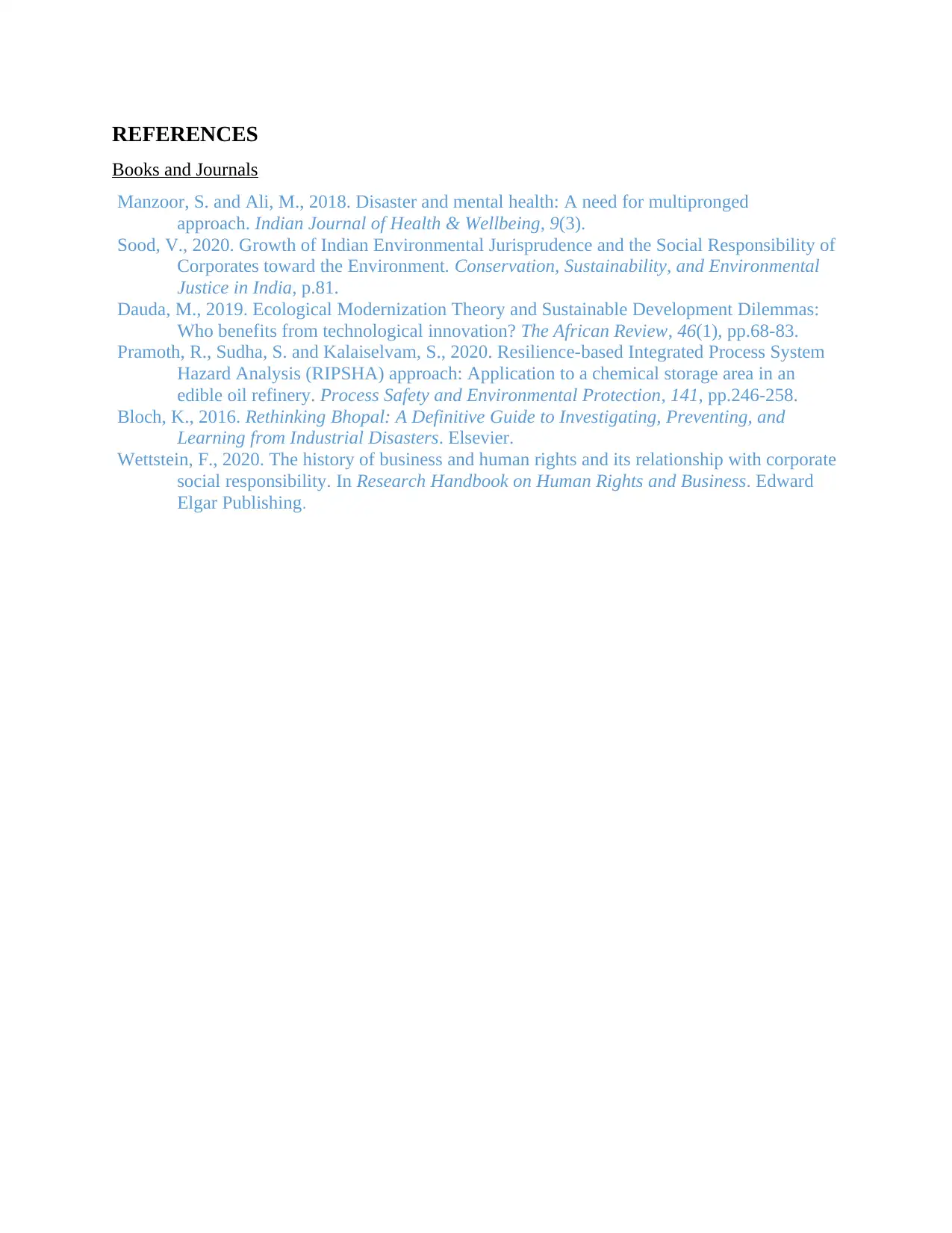
REFERENCES
Books and Journals
Manzoor, S. and Ali, M., 2018. Disaster and mental health: A need for multipronged
approach. Indian Journal of Health & Wellbeing, 9(3).
Sood, V., 2020. Growth of Indian Environmental Jurisprudence and the Social Responsibility of
Corporates toward the Environment. Conservation, Sustainability, and Environmental
Justice in India, p.81.
Dauda, M., 2019. Ecological Modernization Theory and Sustainable Development Dilemmas:
Who benefits from technological innovation? The African Review, 46(1), pp.68-83.
Pramoth, R., Sudha, S. and Kalaiselvam, S., 2020. Resilience-based Integrated Process System
Hazard Analysis (RIPSHA) approach: Application to a chemical storage area in an
edible oil refinery. Process Safety and Environmental Protection, 141, pp.246-258.
Bloch, K., 2016. Rethinking Bhopal: A Definitive Guide to Investigating, Preventing, and
Learning from Industrial Disasters. Elsevier.
Wettstein, F., 2020. The history of business and human rights and its relationship with corporate
social responsibility. In Research Handbook on Human Rights and Business. Edward
Elgar Publishing.
Books and Journals
Manzoor, S. and Ali, M., 2018. Disaster and mental health: A need for multipronged
approach. Indian Journal of Health & Wellbeing, 9(3).
Sood, V., 2020. Growth of Indian Environmental Jurisprudence and the Social Responsibility of
Corporates toward the Environment. Conservation, Sustainability, and Environmental
Justice in India, p.81.
Dauda, M., 2019. Ecological Modernization Theory and Sustainable Development Dilemmas:
Who benefits from technological innovation? The African Review, 46(1), pp.68-83.
Pramoth, R., Sudha, S. and Kalaiselvam, S., 2020. Resilience-based Integrated Process System
Hazard Analysis (RIPSHA) approach: Application to a chemical storage area in an
edible oil refinery. Process Safety and Environmental Protection, 141, pp.246-258.
Bloch, K., 2016. Rethinking Bhopal: A Definitive Guide to Investigating, Preventing, and
Learning from Industrial Disasters. Elsevier.
Wettstein, F., 2020. The history of business and human rights and its relationship with corporate
social responsibility. In Research Handbook on Human Rights and Business. Edward
Elgar Publishing.
1 out of 8
Related Documents
Your All-in-One AI-Powered Toolkit for Academic Success.
+13062052269
info@desklib.com
Available 24*7 on WhatsApp / Email
![[object Object]](/_next/static/media/star-bottom.7253800d.svg)
Unlock your academic potential
Copyright © 2020–2026 A2Z Services. All Rights Reserved. Developed and managed by ZUCOL.





